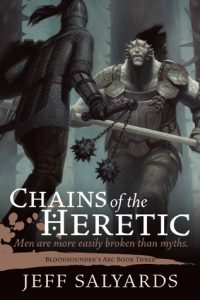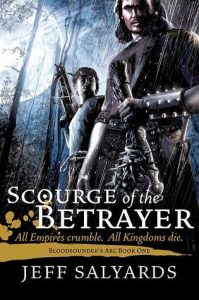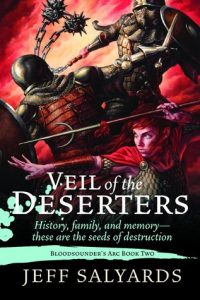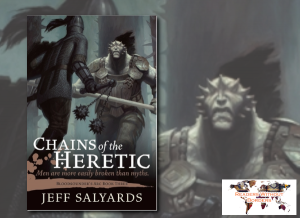Readers Without Borders – Second Update
June Readathon – #ReadersWithoutBorders

Second Update – Chains of the Heretic
For those who missed it, I’ve joined the #ReadersWithoutBorders charity readathon for June, all in aid of Doctors Without Borders. The readathon is the brainchild of J D Roberts at The World of SFF, and simply consists of a personal reading challenge and, for those with blogs, a blog post or two about it.
My reading challenge was to read three books that are the third book in a series (#3book3s), and in my introductory post I highlighted four candidates – and I’ve now finished the second. For the third, seeing as I’ve only got a few days left in the month and unfortunately can’t use all my hours for reading, I’m going to play my wild card and pick up the Murderbot novella, Rogue Protocol by Martha Wells, which I happen to have in very pretty hardcover.
Chains of the Heretic by Jeff Salyards
 I am so glad to have finally finished this series, which is definitely one of my favourites and a proper hidden gem as well. I was lucky to see good reviews of it in my online circles, and finally got my hands on the first book two years ago. Right from the start of Scourge of the Betrayer, I knew this would be a series for me. Small-scale to the point of myopia, it is the first-person narrative of a scribe recruited to document the activities of a company of rough, tough, and deadly soldiers on a secret mission. The end of the second book expanded the scope considerably, as the soldiers returned to their empire to be caught up in political upheaval, leaving the third with a lot of heavy lifting left to do.
I am so glad to have finally finished this series, which is definitely one of my favourites and a proper hidden gem as well. I was lucky to see good reviews of it in my online circles, and finally got my hands on the first book two years ago. Right from the start of Scourge of the Betrayer, I knew this would be a series for me. Small-scale to the point of myopia, it is the first-person narrative of a scribe recruited to document the activities of a company of rough, tough, and deadly soldiers on a secret mission. The end of the second book expanded the scope considerably, as the soldiers returned to their empire to be caught up in political upheaval, leaving the third with a lot of heavy lifting left to do.
Which may be part of why it’s fully twice as long as the first book!
For me, the series stands out for a few reasons. First, the narrative is not only focused on a few characters, but documents most of their actions in some detail, rarely skipping days or hand-waving through off-page events. This works best in the first book-and-a-half, when the company was on their own, engaged in small-scale actions and subtle subterfuges. When events start to grow in scale and scope, it can make for slightly uneven pacing, and the final climax seems particularly rushed – but macroscopic events aren’t really the point of the series. In contrast to more sprawling epics, the limited scope forced by the single POV works really well for me. Yes, there are times when the excuse to bring the non-combatant narrator along to witness key events seems a little stretched – but never too far, I think.
 The other key component, critical for a series of such tight focus, is the vibrant characters – and again, the central cast is quite small. The protagonist is Captain Braylar Killcoin, the company’s irascible but eloquent leader, who carries the double-headed flail, Bloodsounder, so pivotal in their fate. The series is aptly named Bloodsounder’s Arc, and concludes with the end of his story. Arki, the narrator, is important in events but, realistically, never turns into some prodigious YA hero. Keeping him in his place are the bickering officers, chiefly the foul-mouthed Mulldoos, sagacious Hewspear, down-to-earth Vendurro, and, in the third book, the man-mountain Azmorgon. Their banter and interplay is the critical ingredient making the barely edited documentary a joy rather than a slog.
The other key component, critical for a series of such tight focus, is the vibrant characters – and again, the central cast is quite small. The protagonist is Captain Braylar Killcoin, the company’s irascible but eloquent leader, who carries the double-headed flail, Bloodsounder, so pivotal in their fate. The series is aptly named Bloodsounder’s Arc, and concludes with the end of his story. Arki, the narrator, is important in events but, realistically, never turns into some prodigious YA hero. Keeping him in his place are the bickering officers, chiefly the foul-mouthed Mulldoos, sagacious Hewspear, down-to-earth Vendurro, and, in the third book, the man-mountain Azmorgon. Their banter and interplay is the critical ingredient making the barely edited documentary a joy rather than a slog.
There are also a few women in the mix, though this is perhaps where the series falls down a bit, because, with the exception of the captain’s memory-wizard sister, there seems to be a limit of one per book as far as the main cast goes. I liked the one in the first book, best, I think. Still, events mean that they do get the last word, even if a lot of it is off the page.
 Another stand-out aspect is the action – of which there is plenty. This is thoroughly a “military fantasy”, but less one about grand strategies and tactics and more about the soldiering life and the chaos of small-scale action. Arms and armour are realistically depicted, as far as I can tell, with armour actually working as intended a lot of the time – no plate-slicing swords here. Neither are there invincible heroes who can take out scores of the enemy on their own (memory wizards aside), rather the odds always seem properly weighted and wounds matter.
Another stand-out aspect is the action – of which there is plenty. This is thoroughly a “military fantasy”, but less one about grand strategies and tactics and more about the soldiering life and the chaos of small-scale action. Arms and armour are realistically depicted, as far as I can tell, with armour actually working as intended a lot of the time – no plate-slicing swords here. Neither are there invincible heroes who can take out scores of the enemy on their own (memory wizards aside), rather the odds always seem properly weighted and wounds matter.
As far as things like worldbuilding and larger plots go, the series does an understated job with both. While sticking to a degree of realism, the fantastical flourishes – like memory magic and the all-important Godsveil – are imaginative and well done. There are also evocative hints at a wider world beyond the somewhat cramped map the action takes place in. However, until about the last fifth of the second book, we’ve only seen a few dusty villages and one medieval city. From there on into this third book, things become a lot more Epic in scope and content – and, at first, if I’m honest, I was a bit disappointed to lose that uniquely tight focus. However, by the conclusion – even if it was a bit rushed – it won me back wholeheartedly.
And when you finally get to see beyond the Veil, it’s definitely worth it.
Hopefully the third of my book threes will finish my readathon trilogy as well as this Chains of the Heretic rounded off Bloodsounder’s Arc.


[…] of the Deserter to conclude in Chains of the Heretic, which I finished this year. As I describe at Fantasy-Hive, I wasn’t as enthralled by the two sequels, mostly because they expanded the story and moved […]
I’ve heard that pattern a lot from people who’ve enjoyed the series. For me, it was slightly the opposite, as I really liked the small-scale, tight-focus uniqueness of the first book, but the rest became a bit more standard epic fantasy fare – albeit still very good. But I like strange things!
This was one of those series that grew on me. I enjoyed the first book, but wasn’t completely thrilled. I loved the second book, though, and thought the third was utterly amazing. So glad to see Salyards getting some press. 🙂